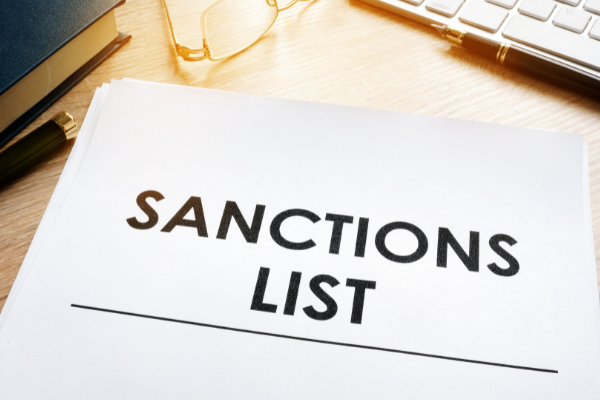BY:
SHARE:

With last week’s updated “Strategic List of Military and Dual-Use Items that Require Export Authorisation”, we have further evidence that Export Control Compliance continues to evolve.
The Export Control Order 2008 and relevant Schedules, 2 for the UK Military List and 3 for the UK Dual-Use List have been updated to reference the relevant Statutory Instruments. The Strategic List is now updated as follows.
The UK Strategic Control Lists are drawn from the following legislation:
The Export Control Order 2008 SI 2008/3231:
Schedule 2, last amended by SI 2023/695 [UK Military List]
Articles 4A and 42S [UK Security and Human Rights List]
Schedule 3, last amended by SI 2023/302 [UK Dual-Use Control List]
The EU Dual-Use List is still relevant to the UK under Retained Regulation 428/2008, which was last amended by SI 2023/695.
An example of additional items controlled under Dual Use is the Wassenaar Arrangement adding two controls:-
Firstly, “Permanent magnet electric propulsion motors specially designed for submersible vehicles, having a power output exceeding 0.1 MW”, which is under controlled under 8.a.002.o.4.
Secondly, "Technology", not specified in certain sections, is "required" for the "development" of any of the listed components or systems, specially designed for aero gas turbine engines to enable "aircraft" to cruise at Mach 1 or greater for more than 30 minutes is controlled under 9.e.003.k.
These additions feature in the updated Strategic List, amongst other changes.
Other items in the Strategic List, such as Retained Firearms Regulation, won’t apply to everyone, however, it is essential to be aware that an updated list could impact our business activities and compliance responsibilities.
In recent months we have seen examples of how Export Controls can become more specific to trade areas. In the UK, Military End Use control guidance was expanded to emphasise the importance of due diligence by being “aware” of the end use for your goods. It’s still the case that Military End-Use Controls could apply via an application submitted on SPIRE to the ECJU or if a consignment is subject to checks at the border by HMRC or Border Force.
It is important to remember that UK export licence applications will be considered against the Strategic Export Licensing Criteria, which was communicated in parliament on 8th December 2021 with increased Sanctions and Embargoes; it is essential to remind ourselves of what criteria are considered when our application is with “other government departments”.
Criterion One – Respect for UK International Obligations, relevant commitments, UN Security Council Sanctions and agreements on Non-Proliferation.
Criterion Two – Respect for human rights and fundamental freedoms in the country of final destination as well as the country’s respect for humanitarian law
Criterion Three – Preservation of internal peace and security
Criterion Four – Preservation of peace and security
Criterion Five - The national security of the UK and territories whose external relations are the UK’s responsibility, as well as that of friendly and allied countries
Criterion Six - The behaviour of the buyer country with regard to the international community, particularly its attitude to terrorism and transnational organised crime, the nature of its alliances and respect for international law.
Criterion Seven - The existence of a risk that the items will be diverted to an undesirable end-user or for an undesirable end-use.
Criterion Eight - The compatibility of the transfer with the technical and economic capacity of the recipient country, taking into account the desirability that states should achieve their legitimate needs of security and defence with the least diversion for armaments of human and economic resources.
Finally, it is also essential to be aware that in exceptional circumstances, the government may not grant a licence for reasons other than that set out in Criteria 1 to 8 when items may significantly negatively impact the UK’s international relations.
These points may not be at the front of our minds if we use an Open General Export Licence or Retained General Export Authorisation or, potentially, the goods do not feature on the Strategic List. Still, checking the Commodity Code on the UK Tariff will highlight which destinations are restricted. Due diligence checks always need to go further than the consignee.
We’ve also seen an example of US Legislation becoming part of an EU Member State restriction.
Although Dual Use regulations conform in all EU Members states, whereas the UK has kept the older Retained Regulation 428/2009, the EU Dual Use Regulations are now documented in the legislation 2021/81 refers to.
On September 1st, the Dutch Government will apply additional restrictions on advanced semiconductor manufacturing equipment and related technology and software. The control relates to certain Dual Use Category 3 classifications and would apply to export out of the European Union. The Netherlands has explicitly flagged this control because of their role in producing these types of goods, which can contribute to developing high-quality military (weapon) systems and weapons of mass destruction. This update relates to a US Commerce Control List restriction implemented in October 2022 advising controls on specific advanced and high-performance computer and semiconductor components to China.
It's important to remember that the UK has a specific Dual Use List in addition to 428/2009, which has “PL” controls applicable to various countries.
Export Controls have always been a concern for the trading world. At the end of June 2023, the Five Eyes partners, the United States, Australia, Canada, New Zealand, and the United Kingdom, met to commit to formalising coordination on export control enforcement. Further details can be found here https://www.bis.doc.gov/index.php/documents/about-bis/newsroom/press-releases/3294-2023-06-28-bis-press-release-five-eyes-export-enforcement-coordination/file, but the aim is to create co-ordination in several activities including knowledge and information sharing to reduce proliferation across world trade.
If you are interested in exploring this topic further, you might find it worthwhile to consider the training courses and live clinics offered by Strong & Herd LLP:
OneCall™ Email assistance as and when required; A one-call solution for all your import, export and customs enquiries. Export help. Import help. Customs help.
Stay informed about customs and international trade matters by subscribing to our OneCall™ service. This comprehensive offering includes a dedicated email helpline for support, timely practical updates direct to your inbox (Did You Know?), monthly UK Customs & Trade Briefings and access to an interactive members' area with an exclusive community for our subscribers.
International Trade Updates & Spotlight Newsletter
Subscribe to our free information emails covering international trade topics...












